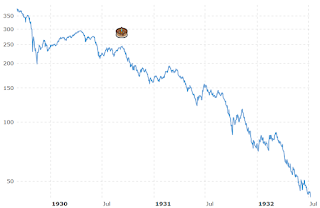<ウォーレン・バフェット> そのような反応は、いささか信じがたく思えるかもしれません。1954年には、以前とは異なる国に変わっていたからです。しかし、だれもがその疑念を抱いていました。実際のところ、「崖の上から、またしても飛び降りるのか」と不安がられるほどでした。なぜなら、1929年に付けた381ドルを超えていたからです。そこで、アーカンソー州選出のビル・フルブライト上院議員は、のちに外交委員会の件でとても有名になる人物ですが、上院銀行委員会の委員長だった彼は特別調査を開始しました。彼は「株式市場調査」と称していたと思いますが、その報告書を読んでみれば、彼が「次なる砂上の楼閣を築いてきたのか否か」という疑念を本当に抱いていたことが読みとれます。ところで、この委員会には興味をひく点があります。委員の一人はプレスコット・ブッシュ、かのジョージ・H・W・ブッシュの父であり、ジョージ・W・ブッシュの祖父に当たる人でした。そのほかにも著名な名前が散見されます。
彼の委員会は1955年3月のダウ平均が405を付けた日に、米国きっての英邁(えいまい)なる20名の参考人を招致しました。そして、わが国が狂った領域へと再び突入しようとしているか否かについて、意見を聴きました。市場を代表する指標のダウ平均が400ドルに達したものの、かつてそれが大変な問題となったからです。それがこの国における受け止めかたでした。それほどまでの重大事でした。
実際のところ当時の人たちは、現実の歴史が示したようにはならないと考えていました。今日持参したこの1,000ページの本を読めばわかります。この本は昨夜自宅の書架から見つけだしたもので、わたしにはおなじみの一冊です。さて、フルブライト議員の面前で発言をすることになった20名のなかには、わたしがニューヨークで働いていた時の上司が含まれていました。上司の前に発言した参考人は、シアーズ・ローバックを率いていたジェネラル・ウッドでした。そして上司の後の参考人は、連銀を率いていたビル・マーチンでした。彼らの示した見解はきわめて重要なものでした。ビル・マーチンは言うまでもなく、連銀創設以来、議長の座にもっとも長く就いていた人物です。連銀が果たすべき仕事について彼が語った言葉に、有名なものがあります。「パーティーがいよいよ活気づいてきた頃に、パンチ・ボウル[いわば酒瓶]を下げることである」。
(Warren Buffett 47:33)
And that seems a little farfetched because it was a different country in 1954, but that was the common question, and it actually achieved such a level of worry about whether we were about to jump off another cliff just because the 381 of 1929 had been exceeded, that they held, Senator Fulbright, Bill Fulbright of Arkansas, who became very famous later in terms of the foreign relations committee, but he headed the Senate Banking Committee, and he called a special per special investigation, and he calls it the, what did he call it? The stock market study, but it really, if you read through it, he really was questioning whether we had built another house of cards again, and on this committee, it's interesting to see the Senate Finance Committee, one of the members was Prescott Bush, the father of George H. W. Bush, and grandfather of George W. Bush, and it had some illustrious names.
(Warren Buffett 48:54)
His committee, in March of 1955, with a Dow of 405, assembled 20 of the best minds in the United States to testify as to whether we were going crazy again, because the market was at 400, the Dow was at 400, and we had gotten in this incredible trouble before, but that was the mindset of the country, it's incredible.
(Warren Buffett 49:24)
We didn't really believe America was what it was, and my was, the reason I'm familiar with this 1000-page book that I have here, I found it last night in the library, was that I was working in New York for one of the 20 people that was called down to testify before Senator Fulbright, and he testified right before Bill Martin, who was running the Federal Reserve, testified, and right after General Wood who was running shares testified, theirs was very, very important then, and Bill Martin of course was the fellow that longest running chairman in the history of the Fed, and he's the one that gave the famous quote about the function of the Fed was to take away the punch balls just when the party started to get really warmed up.
なお、ウォーレンが紹介していた報告書『証券市場調査』のコピーは、Google PlayのBooksで閲覧できます(ただし、ページの端がうまく複写できていない箇所もあります)。
・Stock Market Study, Hearings Before the Committee on Banking and Currency, United States Senate, Eighty-fourth Congress, First Session, on Factors Affecting the Buying and Selling of Equity Securities














